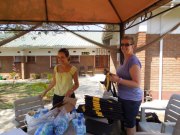The United Nations Children’s Fund (UNICEF) has resumed funding for its Water, Sanitation and Hygiene (WASH) Project in Kasungu after it was suspended in 2009 due to financial mismanagement.
Kasungu was blacklisted after the district’s Water Department allegedly embezzled K17 million meant for construction of pit latrines in some schools in the district.
Former District Water and Sanitation Officer Tamandani Kamwachale Tembo, and District Hospital Environmental Officer James Nyirenda are currently answering charges in connection with the missing money.
District Commissioner Harrison Lende said on Friday that UNICEF agreed to resume funding the project after being satisfied with measures the council had put in place to avoid a recurrence of the 2009 incident.
“It is true that UNICEF has resumed funding to the district,” confirmed Lende, saying the resumption was as a result of strong fiscal measures put in place to safeguard donor funds coming to the district.
He said among other measures, the council had instituted “a very strong” coordinating committee which would be tasked with running WASH projects for the district.
Lende also disclosed that Kasungu had suffered significantly in areas of water and sanitation following UNICEF’s withdrawal of funds to the district.
“The funds we were receiving from UNICEF enabled us to sink additional boreholes and when UNICEF, we also stopped sinking these boreholes,” he said.
Meanwhile, an assessment by Kalondolondo Programme of water and sanitation situation in seven traditional authorities of Kasungu has revealed insufficient distribution of boreholes forcing communities to resort to using unsafe water sources.
The development has left people in the said areas at risk of contracting waterborne diseases such as diarrhoea and cholera, especially during rainy season.
Among other major challenges, the assessment has established that communities walk up to two kilometres in search of clean water and in most cases, borehole-to- people ratio is very high, with up to 2,600 people using one borehole.
World Health Organisation (WHO) recommends that people should not travel for more than 500 metres in search of safe water and that borehole to people ratio should not exceed 1 to 250.




